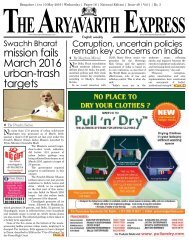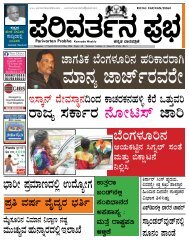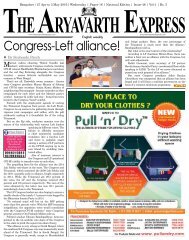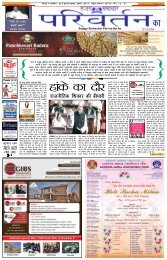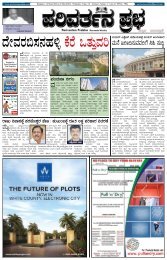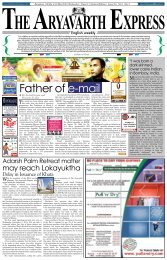You also want an ePaper? Increase the reach of your titles
YUMPU automatically turns print PDFs into web optimized ePapers that Google loves.
FT 1100<br />
6<br />
...impressions<br />
Creativity / Living<br />
& influences Vs attractions & expressions<br />
09 Mar to 15 Mar 2016<br />
No signs of doubling the farmers’<br />
<br />
By Devender Sharma<br />
The average income<br />
a farmer gets from<br />
farming activities,<br />
including what he<br />
keeps for his family<br />
consumption at home, in<br />
17 States of India is Rs<br />
20,000 a year. In other<br />
words, the monthly<br />
income of a farmer in<br />
these States is a paltry Rs 1,666.<br />
Yes, you got it right. Rs 1,666 only.<br />
Now, put yourself in this picture frame.<br />
If you were a farmer and able to make only<br />
Rs 1,666 per month what would you like<br />
to do? Wait for another five years? Live on<br />
hope, thinking woh subah kabhi to aayegi<br />
..<br />
So when Finance Minister Arun<br />
Jaitley, while presenting the budget 2016,<br />
yesterday in Parliament said: “We need to<br />
think beyond ‘food security’ and give back<br />
to farmers a sense of ‘income security’” I<br />
waited with an abated breath. But when<br />
all that he promised was to double farmers’<br />
income by 2022, still good five years away,<br />
all my hopes came tumbling down.<br />
Five years, the Finance Minister wants<br />
the farmers to wait. After five years,<br />
and even if the promise is realised, the<br />
income of farmers in these 17 States will<br />
go up to Rs 3,332 a month. I can imagine<br />
the Economic Survey, to be presented<br />
in 2022, proudly stating that because of<br />
the continuous efforts, the government<br />
has succeeded in doubling farmers<br />
income. Certainly, what an ‘achievement’<br />
economists would say. But by that time,<br />
adjusting for inflation, even the Rs 3,332<br />
would be equivalent to Rs 1,666 that a<br />
farmer is able to make now.<br />
This surely is a sense of ‘income security’<br />
that the government has promised.<br />
At a time when agriculture is in deep<br />
crisis, with agrarian distress lomming<br />
large over the past several years,<br />
something that even the Economic<br />
Survey 2016 brings out quite in detail,<br />
I was expecting the government to<br />
income in next five years<br />
perform an immediate surgical operation.<br />
Considerting that the spate of farmer<br />
suicides has jumped from the existing<br />
nationwide average of 42 a day, to 52 a day<br />
in 2015, agriculture required an urgent<br />
attention. Just mentioning agriculture<br />
some 50 times in the budget speech<br />
provides no succour to a sector which is<br />
languising in neglect and apathy.<br />
Prevailing farm crisis is not an outcome<br />
of low agricultural productivity. It is not<br />
as if the farmers do not know how to<br />
increase crop productivity as a reult of<br />
which his income continues to stagnate.<br />
Productivity is important but if it is not<br />
backed by remunerative price, a farmer<br />
will continue to suffer. Take the case of<br />
Punjab, India’s frontline agricultural<br />
State. Punjab farmers produce 4,500 Kg/<br />
hecatre of wheat and 6,000 kg/hectare<br />
of paddy – a very high crop productivity<br />
indeed – in an area that has 99 per cent<br />
assured irrigation. All the development<br />
indices that the government is projecting<br />
in this year’s budget , including expanding<br />
irrigation, are already existing in Punjab.<br />
And yet, according to the calculations of<br />
the Commission for Agricultuiral Costs<br />
Ground Reality<br />
and Prices (CACP) the net income from<br />
a hectare of cultivating wheat and paddy<br />
(the usual cropping pattern followed in a<br />
year) is about Rs 36,000, which comes to<br />
a monthly realisation of Rs 3,000 only.<br />
Compare this with the basic monthly<br />
salary of Rs 18,000 a chaprasi will get after<br />
the 7th pay Commission is implemented. I<br />
will not be surprised if a newly-appointed<br />
chaprasi also becomes eligible to pay<br />
income tax soon after he joins service.<br />
Economic Survey 2016 therefore is<br />
wrong when it says that the central<br />
challenge to Indian agriculture is low<br />
productivity. The primary challenge, let<br />
me make it clear, is what the Finance<br />
Minister spelled out, and rightly so, is –<br />
‘income security’.<br />
Talk of farmers income and mainline<br />
economists as well as the mainline media<br />
spare no effort to brand you a leftist. On<br />
several TV channels yesterday I was<br />
appaled to see how panelists were visibly<br />
disappointed even at the emphasis on<br />
the word ‘agriculture’ in the budget<br />
speech. What is not being understood<br />
is that agriculture has turned unviable<br />
not because it is unproductive or is not<br />
paying enough but has been deliberately<br />
kept impoverished all these years. Let me<br />
explain. In 1970, the minimum support<br />
price (MSP) for wheat that the farmers<br />
received was Rs 76 per quintal (100 Kgs)<br />
In 2015, 45 years later, the MSP for wheat<br />
was raised to Rs 1,450 per quintal, an<br />
increase by 19 times.<br />
In the same period, the basic salary<br />
(plus Dearness Allowance) of government<br />
employees has gone up by 120-<br />
150 times; of college teachers and<br />
university propfessors by 150<br />
to 170 times; of school teachers<br />
by 280 to 320 times; and of top<br />
executives of India Inc by a<br />
whopping 1,000 times. While<br />
the salaries of employees were<br />
raised phenomenally in the past<br />
45 years, farmers were starved<br />
of their legitimate dues. If only<br />
the wheat price had been raised<br />
by the same yardstick, hiking it<br />
100 times at least, the MSP for<br />
wheat should have been at least<br />
Rs 7,600 per quintal. The<br />
arguement is that if wheat prices go<br />
up, food inflational will skyrocket. It is<br />
therefore obvious that farmers had been<br />
penalised all these years merely to keep<br />
food inflation in control.<br />
This is the reason why the NDA<br />
government has backtracked on its<br />
promise of providing 50 per cent profit<br />
over the cost of production. Farmers<br />
income, seen through the hike in MSP,<br />
has only been raised by a nominal 3.2 to<br />
3.6 per cent every year. So while every<br />
else in the organised sector gets a hefty<br />
pay hike, farmers are being deliberately<br />
ignored. I thought it was an appropriate<br />
moment for the government to make up<br />
for its ‘anti-farmer’ image. The enhanced<br />
public sector investment in agriculture<br />
has to be accompanied by steps that<br />
can boost farm income. If only the<br />
government had announced a Rs 3-lakh<br />
crore economic bailout package for the<br />
farming community, and followed it up<br />
by setting up a National Farmers Income<br />
Commission to ensure that farmers get a<br />
guaranteed monthly take home income<br />
package, the wheels of economic growth<br />
would have spiralled. More income into<br />
the hands of 60-crore farmers would have<br />
not only provided them with ‘income<br />
security’ but also created a huge domestic<br />
demand thereby leading to the revival of<br />
industrial growth.<br />
This in reality is the only prescription<br />
for Sabka Saath Sabka Vikas.<br />
Presents<br />
gorgeous model<br />
Why It’s Better to Ferment Paddy Straw Than Burn It<br />
At a farm fair in Punjab, Vivian Fernandes<br />
comes across an entrepreneur who tells<br />
farmers why paddy straw is not for burning.<br />
By turning paddy straw into manure through<br />
fermentation, an engineer turned entrepreneur<br />
says he has tackled Punjab’s twin problems of postkharif<br />
atmospheric pollution and water logging in<br />
the south-west region.<br />
Sanjeev Nagpal, Sampurn Agri Ventures. Photo<br />
by Vivian Fernandes<br />
Sanjeev Nagpal of Sampurn Agri Ventures has<br />
set up a plant in the border district of Fazilka to<br />
digest paddy straw anaerobically and produce<br />
manure rich in silicon which plants need for cell<br />
formation. He says, in the process it can drain out<br />
the district’s excess groundwater caused by seepage<br />
from canals that irrigate it. Rising water tables are<br />
destroying kinnow orchards in the Abohar area,<br />
which is Punjab’s citrus hub.<br />
Punjab produces 20 million tonnes of paddy<br />
straw every year. Its high silica content makes it<br />
unpalatable for cattle. Since the cost of rolling it into<br />
compact bales and transporting it to power plants is<br />
For Your Valuable ads Ramesh: 8904452576<br />
Bring This paper<br />
Cutting and get<br />
40%<br />
off<br />
CHOICE FURNTECH<br />
A BEST CHOSEN COMFORT FOR ALL<br />
Made in India<br />
2 Years warranty<br />
on site<br />
not economical, farmers tend to burn the straw at<br />
the onset of winter to prepare the fields for wheat<br />
sowing. This poses a health hazard to people in the<br />
state and cities like Delhi.Conservation agriculture<br />
can help as can fermentation to produce manure.<br />
Nagpal’s stall at a farm fair in Abohar, Punjab,<br />
advertises that burning one tonne of paddy straw<br />
releases about 1.5 tonnes of carbon dioxide, 60 kg<br />
of carbon monoxide, two kg of sulphur dioxide, 200<br />
kg of ash and three kg of particulate matter. But<br />
when digested for 35 days, it can produce 600 kg<br />
of manure, which sells for Rs 5,000 a tonne or even<br />
Rs 8,000 when mixed with neem cake to repel pests<br />
like nematodes.<br />
Sampurn Agri Ventures’ plant can process<br />
15,000 tonnes of straw a year, or the output of 7,500<br />
acres. Nagpal says the Haryana government has<br />
agreed to lift his entire production of manure for free<br />
supply to farmers. The manure has orthosilicic acid,<br />
a silicon supplement, which gets depleted when<br />
rice is grown without let. In natural conditions<br />
it is produced about below the surface but usually<br />
beyond the reach of rice plants.<br />
Nagpal says he has innovated on technology<br />
bought from Germany. A by-product from<br />
fermentation is gas rich in methane, about 12,000<br />
cubic meters of it, for which he gets a subsidy. He<br />
hopes to compress the gas and sell it as auto fuel.<br />
The slurry left behind has calcium sulphate and can<br />
be spread over soils to neutralize their alkalinity.<br />
The drained water in the Fazilka area is saline.<br />
To scrub the water of salts, Nagpal employs shrimps,<br />
which need calcium carbonate for shell formation.<br />
The shrimp he exports to Dubai. Technology and<br />
thoughtfulness, it seems, can turn waste into<br />
wealth.<br />
Model: Eashita<br />
Hobbies: Modeling, Dancing<br />
Photography: Yatish YKR (www.portfoliofashion.com)<br />
Modeling Agency: Kaalia International Talent Management (www.kaalia.com)<br />
Smart Mummy<br />
Presents<br />
Smart mom- Alka Sharma,<br />
Smt Alka Sharma, MA (Political Science with PG<br />
Diploma in Management from Bharati Vidya Bhavan<br />
is a successful entrepreneur in capacity as proprietor<br />
SKS TEX INDIA. initiates her Managerial skill in<br />
balancing Business, House hold and above all takes<br />
care of her son Kunal studying in Engineering. Planing<br />
meticulously has proved herself successful mummy<br />
Congrats on INTERNATIONAL WOMEN’S DAY.<br />
Similarly, If anyone among you can also<br />
handle family, house, Profession smartly, then we<br />
request you to send your photo and details to us<br />
on this email: aryavarthexpress@gmail.com<br />
Manufactures and Importers of<br />
Office Furniture and Chairs<br />
20/3, First Floor, Aswathakatte Main<br />
Road, Opp. Street of Shell Petrol<br />
Pump, Old Toll Gate, Kasturiba<br />
Nagar, Mysore Road,<br />
Bangalore-560026<br />
Ph: 080-26740085<br />
MOb: 9902666255<br />
Email: choicefurntech@gmail.com<br />
ceo@choicefurntech.com<br />
www.choicefurntech.com<br />
Marked on Google




